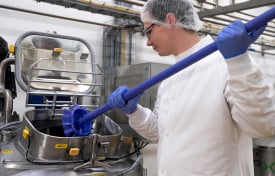Cheese & Dairy Products

- April 23, 2014
Delvo®Cid+ introduces a revolutionary advancement in natamycin technology, mitigating the risk of yeast and mold growth in dairy and meat products with unparalleled speed and efficacy. This breakthrough offers several advantages, including faster solubility, allowing for the rapid protection of liquid products within minutes. Delvo®Cid+ demonstrates improved suspension properties, ensuring natamycin crystals remain active and suspended for extended periods, providing enhanced protection. Highly convenient and cost-efficient, Delvo®Cid+ is a flexible, ready-to-use product with a reduced risk of application errors. With applications in cheese ripening, brine baths, and sausage casings, Delvo®Cid+ is a low-dosage, versatile solution, ensuring immediate safeguarding against contamination and optimal functionality even in challenging conditions like high salt levels.
- April 15, 2014
We have all heard of “helicopter parents,” those that coddle and hover over their kids. Remarkably annoying to educators, scout leaders, etc., one has to at least respect that they (in their own bothersome and overt way) essentially want to ensure their kid’s safety and well-being. Well, what about being a "helicopter" producer?
Don’t you want to ensure the safety and quality of your product when raw ingredients come into your facility or when the finished product heads out on the truck to be sold? Do you worry that your product might be compromised by influences beyond your control? Are you keeping an eye out for things occurring in-house that might compromise your product?
- November 13, 2013
Are you one of our hobbyist customers that makes your own cheese, brews your own beer, etc. for non-retail use? If you are one of these small operators/hobbyists and you
- October 23, 2013
The publication of the USDA’s “Why Are Americans Consuming Less Fluid Milk? A Look at Generational Differences in Intake Frequency” this May has lead to frank discussion in the dairy industry. Citing a ‘“slow continuous shift downward’ in milk drinking since the 1940s,” the report analyzes the causes and potential effects of this downward trend. The trend has been especially felt significantly in the last several decades: “Since 1970 alone, per capita fluid milk consumption has fallen from 0.96 cup-equivalents to about 0.61 cup-equivalents per day”.
So, what is going on here? The authors point to several issues that have energized this trend including the following: frequency of consumption, a diversified marketplace, and generational differences. In regards to frequency, Americans “have become less apt to drink fluid milk at mealtimes, especially with midday and nighttime meals, reducing the total number of consumption occasions.” Part of the reason the frequency has decreased is due to an expanding array of beverage options that are out there for the average consumer.
Milk has been displaced by the consumption of energy drinks, sodas, juices, tea, coffee, etc. The current market offers a wide selection of beverages, choices, and purported claims. For younger consumers this variety and choice is something they have always known, unlike older consumers who remember fewer choices and a lack of access to Taurine-infused energy drinks, iced teas, iced coffee drinks, chocolate soy milk, etc.
- July 17, 2013
Kefir? If you are not familiar with the term, you might be soon. At an increasing number of retail outlets one can find this cultured product that is smooth, creamy, and able
- May 08, 2013
If you have seen "Goodlatte" in the news lately, it might not be in reference to Starbucks. Instead, Reps. Bob Goodlatte, R-Va and David Scott, D-Ga are in the news due to their proposed "Dairy Freedom Act." In response to the Dairy Security Act, the proposed Act, according to the Capital Press, offers margin insurance for "producers to reduce catastrophic losses. But it does so without a milk supply-management element." Numerous manufacturers and retailers have signed on in support of the proposed Act, including the National Grocers Association, the Wisconsin Cheese Makers Association, in addition to many more.
Despite these endorsements, the Act has also drawn some criticism. A piece on the PR Newswire explains: "Opponents of supply management believe it would increase domestic prices
- January 09, 2013
In the food industry and in food safety, accuracy is key. To be able to sample, test, and conduct other lab-related operations on-site or via a third-party lab, is no longer







